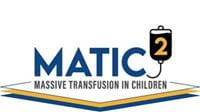
9/21/2023
PITTSBURGH — The No. 1 cause of death in children is trauma. There are an estimated 2,000 pediatric deaths from traumatic bleeding in the U.S. each year that are preventable with optimal care, yet there have been no large-scale clinical trials to guide the best way to resuscitate children with life-threatening bleeding from traumatic injury.
Until now.
The Trauma and Transfusion Medicine Research Center (TTMRC) in the Department of Surgery at the University of Pittsburgh School of Medicine is launching a clinical trial to simultaneously test multiple interventions for life-threatening bleeding in at least 1,000 traumatically injured children across 20 U.S. pediatric trauma centers. Funded by the Biomedical Advanced Research and Development Authority, part of the Administration for Strategic Preparedness and Response within the U.S. Department of Health & Human Service, the trial has a budget of $34 million for the first five years, with the possibility to increase to more than $81 million.
 “This trial will be transformative when it comes to trauma care for children,” said trial co-principal investigator Philip Spinella, M.D., co-director of the TTMRC and professor of surgery and critical care medicine at Pitt. “Not only is trauma the leading cause of death in kids, their mortality rate with life-threatening bleeding is almost twice that of adults. And we think that’s because of delay in recognition and treatment, not that children are less resilient.”
“This trial will be transformative when it comes to trauma care for children,” said trial co-principal investigator Philip Spinella, M.D., co-director of the TTMRC and professor of surgery and critical care medicine at Pitt. “Not only is trauma the leading cause of death in kids, their mortality rate with life-threatening bleeding is almost twice that of adults. And we think that’s because of delay in recognition and treatment, not that children are less resilient.”
The Massive Transfusion in Children-II (MATIC-II) is the first randomized trial to use an approach known as a “platform trial” in traumatically injured children or adults. Typical trials compare only one intervention to standard care, but, in practice, doctors give multiple therapies and drugs at the same time. Platform trials test multiple therapies at once against standard of care, which allows scientists to determine which bundle of care is most effective and safe. Platform trials also allow scientists to change the study interventions based on data collected during the trial. A platform trial can adapt to either add or remove treatments to determine the bundle of care that best improves outcomes.
 “Pediatric trauma research is decades behind trauma research in adults,” said trial co-principal investigator Christine Leeper, M.D., assistant professor of surgery and critical care medicine at Pitt and trauma surgeon and intensivist at UPMC. “In the time it takes to run a traditional trial, new therapies are introduced while others fall out of favor, so the platform design of MATIC-II will ensure the newest and best therapies are put into practice quickly in order to save lives and help close this knowledge gap.”
“Pediatric trauma research is decades behind trauma research in adults,” said trial co-principal investigator Christine Leeper, M.D., assistant professor of surgery and critical care medicine at Pitt and trauma surgeon and intensivist at UPMC. “In the time it takes to run a traditional trial, new therapies are introduced while others fall out of favor, so the platform design of MATIC-II will ensure the newest and best therapies are put into practice quickly in order to save lives and help close this knowledge gap.”
When blood is donated, it is typically divided into three parts: red blood cells, platelets and plasma. Patients experiencing massive bleeding usually need all of those components, so clinicians have to put the blood back together – and that reassembly can dilute the products and make them less effective. Research is increasingly indicating that “whole blood” – blood that was never divided into components after donation – may improve survival and reduce the total amount of blood needed in patients with life-threatening traumatic bleeding.
 MATIC-II will study the efficacy and safety of whole blood, individual blood components and tranexamic acid, which promotes clotting to stop bleeding, compared with a placebo in newborns up to 18-year-olds with trauma and life-threatening bleeding. Four combinations – tranexamic acid with whole blood, whole blood with a placebo, component blood with a placebo and component blood with tranexamic acid – will be tested, with each of the 20 participating children’s hospitals rotating through the combinations throughout the trial. Each of these therapies are used clinically in children with trauma and life-threatening bleeding, but they haven’t been tested either in isolation or as combination therapy.
MATIC-II will study the efficacy and safety of whole blood, individual blood components and tranexamic acid, which promotes clotting to stop bleeding, compared with a placebo in newborns up to 18-year-olds with trauma and life-threatening bleeding. Four combinations – tranexamic acid with whole blood, whole blood with a placebo, component blood with a placebo and component blood with tranexamic acid – will be tested, with each of the 20 participating children’s hospitals rotating through the combinations throughout the trial. Each of these therapies are used clinically in children with trauma and life-threatening bleeding, but they haven’t been tested either in isolation or as combination therapy.
The trial will compare all the combinations to determine which one results in the best patient survival after 24 hours and 28 days. The scientists also will do additional studies to better understand a condition known as trauma-induced coagulopathy, which occurs when the blood fails to properly clot. With Angelo D’Alessandro, Ph.D., professor of biochemistry and molecular genetics at the University of Colorado, the team will determine if there are differences in how the children respond to the interventions. This will form the basis for developing a precision transfusion medicine approach to hemorrhagic shock in children.
“I’m particularly excited about the studies we have planned with Dr. D’Alessandro,” said Spinella. “Just like all cancers aren’t the same, all traumas aren’t the same. Different people and types of trauma respond differently to treatments due to biological factors that we could potentially address to improve outcomes.”
Because emergency trauma care cannot be paused for parents to consent for their children to be in the trial, MATIC-II will have an exception from informed consent protocol that has been approved by an ethics board and the U.S. Food & Drug Administration. Patients will be given the trial treatment, and, once the child is stabilized, the parents will be informed about the trial and their questions will be answered. Parents can then decide whether to give permission for continued participation or remove their child from the trial. Parents can also opt out of having their child in the trial by requesting a special bracelet that will alert emergency clinicians not to use the trial protocol. More information on that will be made available to the public by the investigators before the trial starts.
This project has been funded in whole with federal funds from the Department of Health and Human Services; Administration for Strategic Preparedness and Response; Biomedical Advanced Research and Development Authority, under contract number 75A50123C00047.
PHOTO DETAILS: (click images for high-res versions)
First photo
CREDIT: University of Pittsburgh
CAPTION: Philip Spinella, M.D.
Second photo
CREDIT: UPMC
CAPTION: Christine Leeper, M.D.
Third photo
CREDIT: University of Pittsburgh
CAPTION: Massive Transfusion in Children-II (MATIC-II)
















